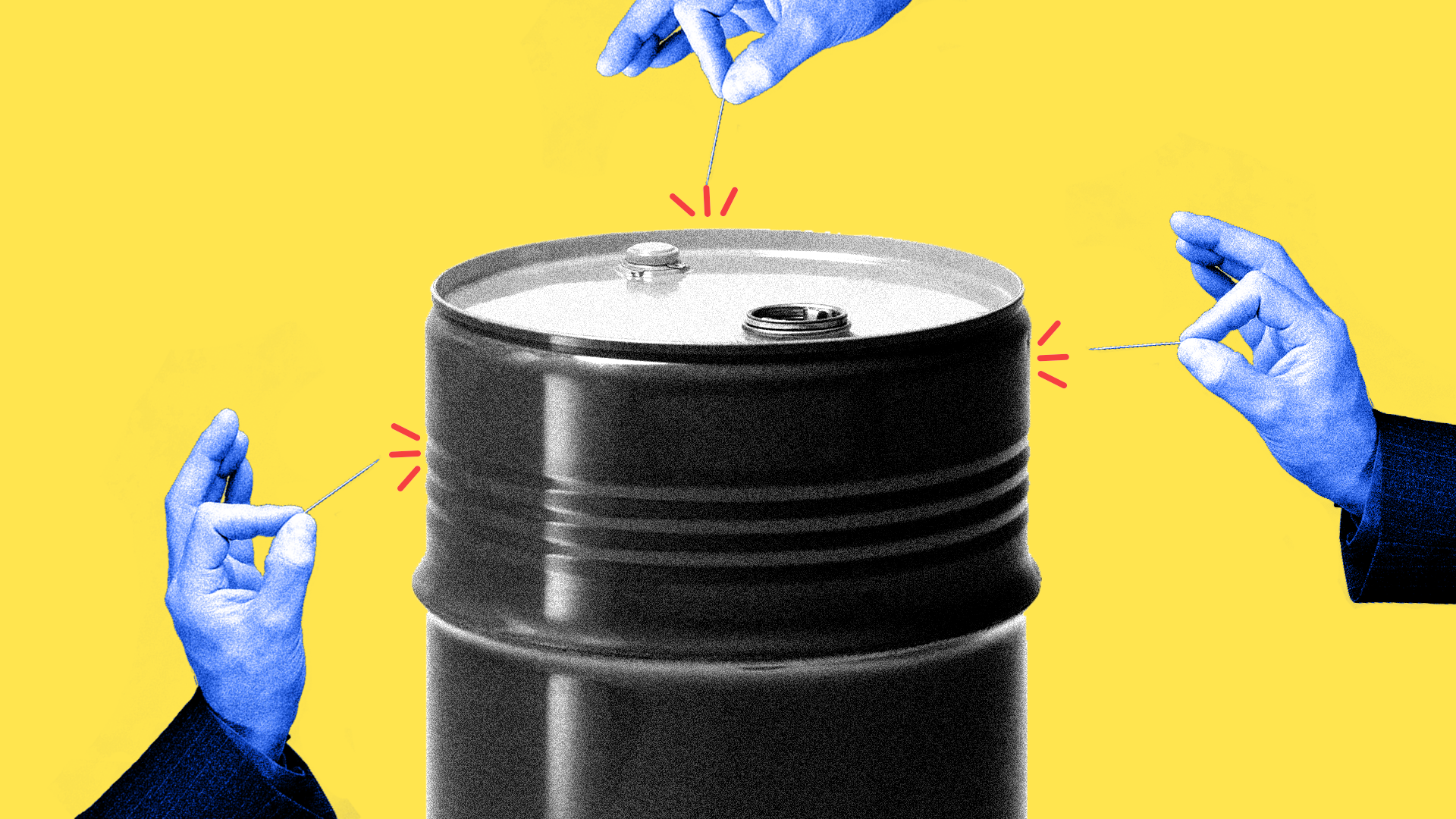The flawed climate gambit against big oil
Add Axios as your preferred source to
see more of our stories on Google.

Illustration: Rebecca Zisser / Axios
New York City and several California municipalities are suing big oil companies, alleging they concealed what they knew about climate change and are liable for billions of dollars of damage caused by rising global temperatures.
Why that’s flawed: The strategy is based on the 1990s lawsuits against tobacco companies, which found they concealed and misrepresented what they knew about the health effects of cigarettes. But climate change is a global problem we’re all collectively causing by burning products owned by fossil-fuel companies. What’s more, the legal roots of these claims today are untested and unlikely to succeed, lawyers supportive of the effort say.
Yes, but: The strategy behind these lawsuits is not just in the courtroom, but also to sway public opinion and pressure oil companies to genuinely advocate for a solution to climate change in Washington, something they’re not doing right now. That could still transpire despite legal losses.
Why this isn’t big tobacco
In a recent interview with BP CEO Bob Dudley that spanned almost two hours, the most animated I saw the executive was when he brought up these lawsuits, which are targeting BP along with other big, publicly owned oil companies.
“People don’t need to smoke cigarettes, but they have needed energy for many decades,” Dudley told me earlier this month. “If you’re asking me can the legal system do something like that, I don’t know. But do I think it’s right? Absolutely not.”
A CEO publicly commenting on pending legal matters is rare, and it shows these lawsuits are rattling the industry despite their unlikelihood of success.
New York Mayor Bill de Blasio announced his lawsuit the day after this interview, while the California cities and counties filed theirs last year.
“The tobacco lawsuits were crucial to changing the public understanding about tobacco,” de Blasio said at a news conference earlier this month. “So these actions today we see as crucial to changing the assumptions. We no longer assume that the fossil fuel companies are innocent.”
Unlike with cigarettes, charges of hypocrisy are running rampant because everyone — including de Blasio — uses fossil fuels. That misses the real issue, backers of the lawsuits say.
“The purity police can find anything,” Dan Zarrilli, senior director of the city's climate policy programs, told Axios. He said the city is doing many things to address climate change along with the lawsuit, and the merits of the case stand on its own, separate from any individual’s use of fossil fuels.
What the lawsuits are seeking
De Blasio and others backing the lawsuits allege that oil and gas companies knew decades ago their products were causing climate change, but concealed that and funded advocacy groups opposing climate policies.
These claims about what they knew are largely based on investigations from 2015 in The Los Angeles Times and InsideClimate News into ExxonMobil’s work on climate change over the past few decades, and to a lesser extent that of the American Petroleum Institute, whose members include the other companies being sued.
Exxon said its position was misrepresented and cherry-picked in the stories, which were both partly funded by groups opposed to Exxon. The publications have said the funding had no influence on their reporting.
“The extent of culpability with the degree of knowledge and what they decided to do has not had a chance to be fully aired in court,” said Michael Burger, director of the Sabin Center for Climate Change Law at Columbia University.
Burger says he’s skeptical the lawsuits will succeed, because of the political nature of the topic and because it’ll be legally difficult to trace precise amounts of causation and blame to the oil industry, let alone particular companies. Showing causation and blame was much more concrete with cigarette companies.
“I think these are very tough cases to win,” Burger said.
Pressure pointing
For the companies, these lawsuits are deemed low probability, high risk. They’re unlikely to succeed, but if they do, it could cost them (and their shareholders) tens of billions of dollars, maybe far more.
If a trial became even a remote possibility, some lawyers predict the oil companies would go to Congress, akin to how cigarette companies did facing their liabilities. The theory goes that industry would push Congress to enact a climate policy like a carbon tax in exchange for limiting liabilities.
“If the lawsuits are going to matter, it’s in changing the status quo,” said Michael Livermore, a professor at the University of Virginia law school, who supports the lawsuits but is skeptical they’ll succeed. “The problem has always been that the status quo is acceptable for the major emitters.”
Most major oil companies say they publicly support a tax on carbon emissions, but they’re not pushing Congress to enact one. To skeptics of the industry, that’s because they’re profiting without climate policy. To the industry, it’s because Congress isn’t considering anything.
“You have to work with people who have an open door and are working with you,” Dudley told me. “We can’t drive national policy anywhere in the world.”
BP is focused on where active or prospective climate policies exist, like China, Europe and other places in the U.S., including Washington state. The state has asked BP for input on its carbon tax proposal, Dudley said.
Would BP support it? “Yeah, if it’s done with an effective mechanism and it’s designed well, yeah we would support that,” Dudley said. “But those are big if’s.”
